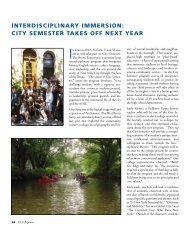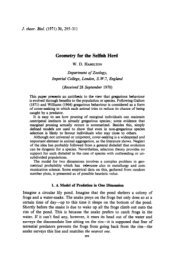Chapter 6 - Ethical Culture Fieldston School
Chapter 6 - Ethical Culture Fieldston School
Chapter 6 - Ethical Culture Fieldston School
You also want an ePaper? Increase the reach of your titles
YUMPU automatically turns print PDFs into web optimized ePapers that Google loves.
“Mr. Sinatra Gets Rejected”<br />
got to be that singer.” As the magazine writer who related this anecdote related,<br />
“Probably a thousand other youngsters who heard Crosby that night painted the<br />
same mental picture – themselves in the spotlight, thrilling millions. But Sinatra<br />
was the one out of a thousand with the courage to chase the rainbow.” 12<br />
Courage, certainly: there’s a lot to be said about that. But it’s also worth<br />
considering the particular rainbow Sinatra was chasing. It had its own arc, and<br />
one can confidently say that had be been born in a different place or time it<br />
would have been situated – and chased – differently. As his chroniclers tirelessly<br />
assert, Frank Sinatra was very much man of his time.<br />
But what time was that? My answer, despite the fact that he is dead and<br />
buried, is now.<br />
Why is Sinatra “now,” when did “now” begin, and why hasn’t “now”<br />
ended? To put it simply, I believe the basic texture of modern American life<br />
emerged during Sinatra’s youth, that he embodied it with unusual clarity, and<br />
that its contours, despite its myriad variations, remain largely in place. Far more<br />
than extraordinary events of his childhood (like the stock market crash) or the<br />
leading figures of his era (like the so‐called Lost Generation), there’s something<br />
accessibly familiar about the rhythms of everyday life in the years following the<br />
First World War, a time known by those who lived it as “The New Era.”<br />
That familiarity is almost palpable, for example, in this description of a<br />
day in the life of the fictional John Smith, “a typical citizen of this restless<br />
republic,” written by an ad agency copywriter in 1928, when Sinatra was twelve<br />
years old:<br />
12 Long, “Sweet Dreams and Dynamite,” p. 13.<br />
American History for Cynical Beginners<br />
9
















